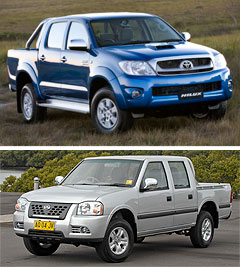News - General NewsEngineers urge mandatory ESC on commercial vehiclesGet a grip: Ford's Transit offers ESC as an option, but many commercial vehicles do not. SAE calls on government to include commercials in mandatory ESC laws13 Jul 2009 By TERRY MARTIN THE Society of Automotive Engineers – Australasia (SAE-A) has called on the federal government to broaden forthcoming legislation mandating the fitment of electronic stability control (ESC) to include commercial vehicles. Transport minister Anthony Albanese last month signed into law new regulations requiring ESC to be fitted to all new passenger cars and SUVs from November 2011, while models currently on the market will have a further two years to install the potentially life-saving technology. However, commercial vehicles including volume-selling utilities – one of which, the Toyota HiLux, was the biggest-selling vehicle in Australia last month – will be exempt from the laws. While the Federal Chamber of Automotive Industries (FCAI) has defended the decision not to mandate ESC on commercial vehicles, the SAE-A believes the new legislation “fails to protect workers and their families by not mandating ESC technology for passenger-carrying commercial vehicles”. SAE-A executive director Max Chanter told GoAuto this week that the government had taken the right direction in mandating ESC for passenger cars, but said the SAE-A failed to understand how Canberra could have overlooked commercial vehicles. “We’re starting to lead the way with this particular legislation, but why stop about two thirds of the way through? Why not go the full distance?” Mr Chanter asked.  Left: Toyota HiLux. Below: Great Wall SA220. Left: Toyota HiLux. Below: Great Wall SA220.“There are an awful lot of vans and utes around these days that don’t have the same facilities and the same (driving) characteristics as a sedan does, but that doesn’t necessarily mean that it doesn’t have the same ‘responsibilities’. “I’m not privy to why they (the government) didn’t go for the whole spectrum, but let’s assume, firstly, that nobody thought about including utes and vans – there’s always that possibility. The next thing, of course, is always going to be cost. “Vans and utes are typically classified as a ‘tradesman’s vehicle’ if you like. And we wonder whether it might have been a bit of an oversight.” The SAE-A’s response comes after the first Chinese brand to be sold in Australia – Great Wall Motors – launched the budget-oriented SA220 and V240 dual-cab utilities late last month. Priced from $19,990, the SA220 includes leather trim and a host of other creature comforts but fails to offer airbags, ABS brakes or a high-mounted rear stop light, let alone ESC. In a statement released last week, the SAE-A said: “Some imported commercial vehicles include luxury fittings, such as air-conditioning, alloy wheels, electric windows and leather trim as standard, while key safety devices airbags, ABS brakes and a single-mounted high stop light are optional, or as in the case of a recently released imported vehicle, not available at all. “As a minimum, SAE-A wants airbags and ABS to be fitted to vehicles sold in Australia today. Given the worldwide availability of these technologies at competitive prices, the society says it is difficult to imagine why any new vehicle would be allowed on the Australian market in 2009 without these features. “The SAE-A encourages all vehicle importers and fleet operators to take responsibility as corporate citizens to have a duty of care to the drivers and passengers in their vehicles. This would require them to make no compromise on the safety specification of their vehicles.” Mr Chanter said the trend could create two classes of vehicle – ones that are deemed safe, and others that have safety equipment missing in order to have a lower price point. “We would not get involved in saying anything about a new product that’s coming out,” he told GoAuto. “But at the same time one would think that anybody who was going to use the vehicle for anything other than the purposes of delivering things, would think to themselves, ‘Well, maybe I should get a little bit more safety in this for my family’.” Mr Chanter said the society was also concerned that some vehicles were marketed on the basis that “safety features are merely options, like leather upholstery or satellite-navigation” and that this meant buyers were either forced to purchase a vehicle without safety options or wait several months for a “special order” vehicle to be delivered. The Mitsubishi Triton, for example, is one of the few workhorse utes to offer side and curtain airbags. However, as GoAuto has learned, a Triton customer who recently asked for the equipment was told that it would require a special order at the Thailand factory and delay delivery by at least 12 weeks. To demonstrate the effectiveness of ESC, the federal government has quoted from British research that found vehicles equipped with the technology were 25 per cent less likely to be involved in a fatal accident than those without it. GoAuto contacted Mr Albanese’s office for comment, but the minister was unavailable. Read more:Canberra makes ESC mandatoryGovernment set to propose mandatory ESC Industry backs standard ESC |
Click to shareGeneral News articlesResearch General News Motor industry news |














Facebook Twitter Instagram